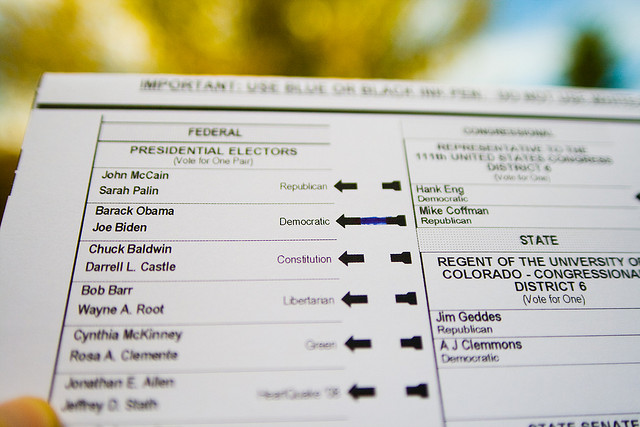Contractor salaries questioned as state moves to paper ballot voting system

Maryland election officials are planning to hire contractors to help with the transition to paper ballots.
By Glynis Kazanjian
State election officials are planning to spend up to $1.2 million to hire just five contractors working for nine months, a high-dollar figure that has shocked key lawmakers and voter advocacy groups watching as the state transitions from touch-screen voting to paper ballots.
The transition, which is scheduled for the 2016 presidential elections, will move the state from computerized voting without a paper trail to optical scan paper ballots. Under the recommendation of State Election Board Administrator Linda Lamone, the state budgeted $1.2 million for the five positions handling the initial transition.
The elections budget calls for the senior project manager position to receive up to $350,000, the deputy project manager $300,000, two business analysts $210,000 each and a technical writer $170,000. The budget figures are estimates, since the elections board has not yet selected contractors.
Committee chairman ‘floored’ by budget proposal
Del. Guy Guzzone, D-Howard, chair of the Public Safety and Administration Subcommittee that oversees the state election board’s budget, said he is “absolutely” concerned with the salaries.
“I was floored when I saw that,” Guzzone said. “I do want to say though that those are estimates. Evidently the consulting in this field is high priced because it is so specialized. The bottom line is we want a product that is as close to perfect as it can be. [But] it’s hard to wrap your head around as being reasonable.”
Elections board defends six-figure contractor payments
State Election Board Deputy Administrator Ross Goldstein defended the expenses. In an email, he stated that the state estimated the cost using an existing state agency master contract for consulting and technical services. In that contract, vendors stated how much they will charge for a given service.
“We used an average from different vendors under the master contract to come up with our estimates for each of the labor categories we need,” Goldstein stated.
Goldstein also provided a letter from Maryland Budget and Management Secretary T. Eloise Foster that argued contractors are needed. The March 18 letter was addressed to Mary Kiraly, a voter rights advocate and former Democratic member of the Montgomery County Board of Elections.
Foster stated that the elections agency is required by law to plan for the project before a request for proposals (RFP) can be sent out.
“Because of their unique, specialized skills, the average project management professional consultant costs between $200k and $275k per year,” Foster stated. “These professionals, plus the 5% required for the statutorily required oversight by the Department of Information Technology (DoIT) will be the costs that make up the majority of the $1.2 million appropriation.”
Voter advocates question need for contractors, pay amounts
Kiraly said that the proposed salaries are generous.
“I would expect the agency to be overwhelmed with job applicants,” she said.
The salary for Lamone, who leads the elections agency, is lower than all five budgeted contractor positions. Lamone’s salary was $110,122 in 2011.
In addition, Rebecca Wilson, co-director of Save Our Votes, claims that the elections board has already done much of the initial work that will be the responsibility of the contractors. In previous attempts to transition to optical scan voting machines, she said the state had written two versions of RFPs (requests for proposal) — a major job of the new consultants.
“They even got as far as selecting a vendor, so everyone is scratching their heads over how it could possibly take five highly paid consultants nine months to write this RFP yet again,” she said.
Transition to paper ballots will cost at least $40 million
Overall, the implementation of an optical scan paper ballot voting system is expected to cost at least $40 million, according to a consultant’s report done in 2010 for the Department of Legislative Services.
The ballot change is required under a 2007 state election law that calls for verifiable paper voting records. While the new law was supposed to apply to elections held after Jan. 1, 2010, Goldstein said the new system could not be implemented because funding had not been approved.
Gov. Martin O’Malley approved $2 million in the budget to allow for the implementation of optical scan ballots to begin. The contractors are set to begin initial work July 1.
Sen. Jim Robey, D-Howard, chair of the subcommittee that oversees the elections board budget on the Senate side, was surprised by the amounts budgeted.
“I need to change careers here,” Robey said, a retired police chief. “Hopefully the RFP [for the contractors] won’t come in that much. On the other hand, when you say we have this much money set aside for a certain slot, if I’m bidding on it, well I know what my bar is on this thing, so I’m not going to come in at $200,000 or $225,000.”

MarylandReporter.com is a daily news website produced by journalists committed to making state government as open, transparent, accountable and responsive as possible – in deed, not just in promise. We believe the people who pay for this government are entitled to have their money spent in an efficient and effective way, and that they are entitled to keep as much of their hard-earned dollars as they possibly can.


